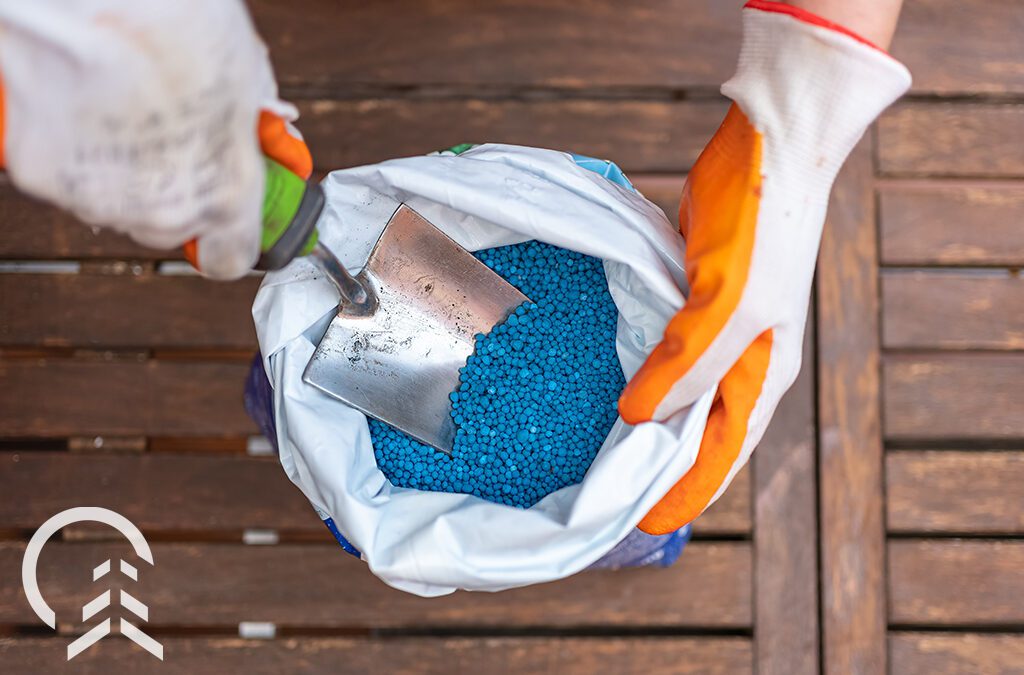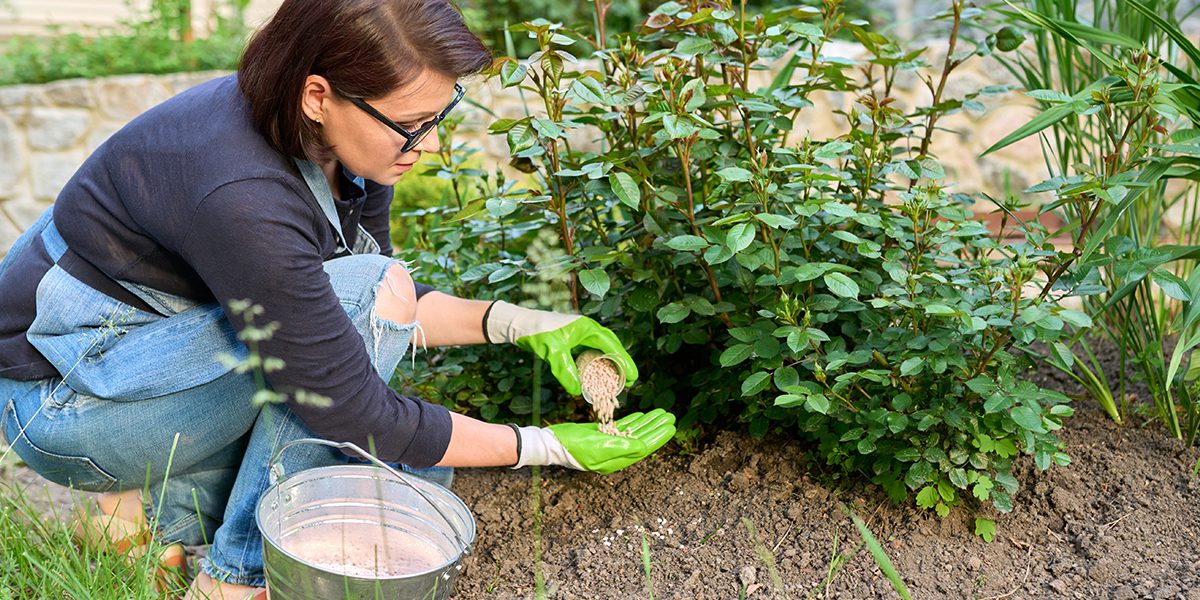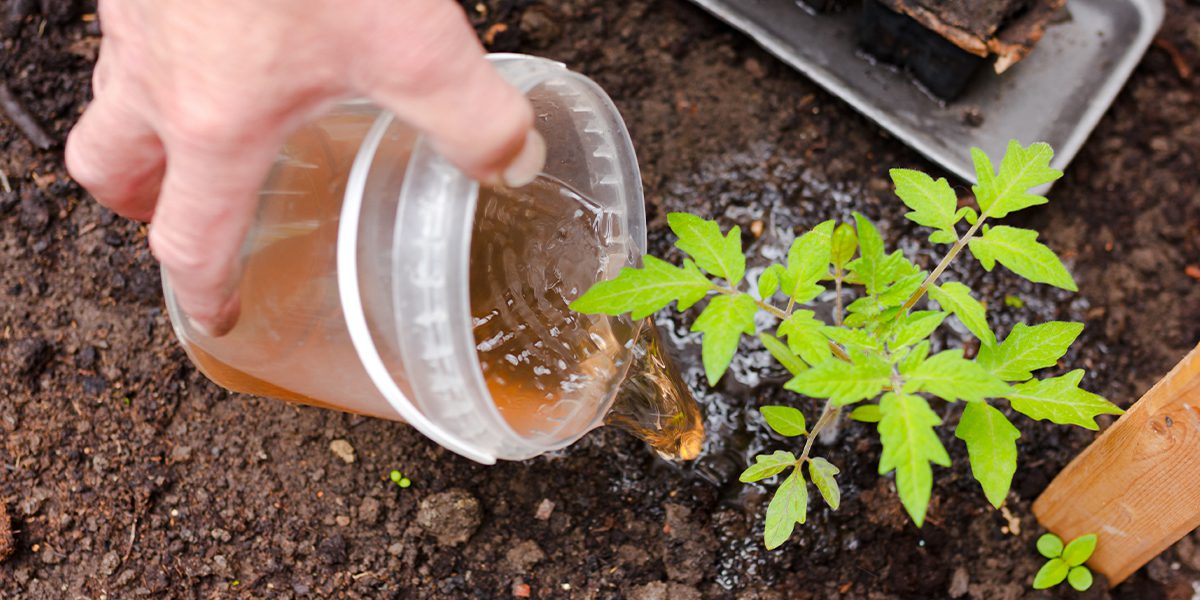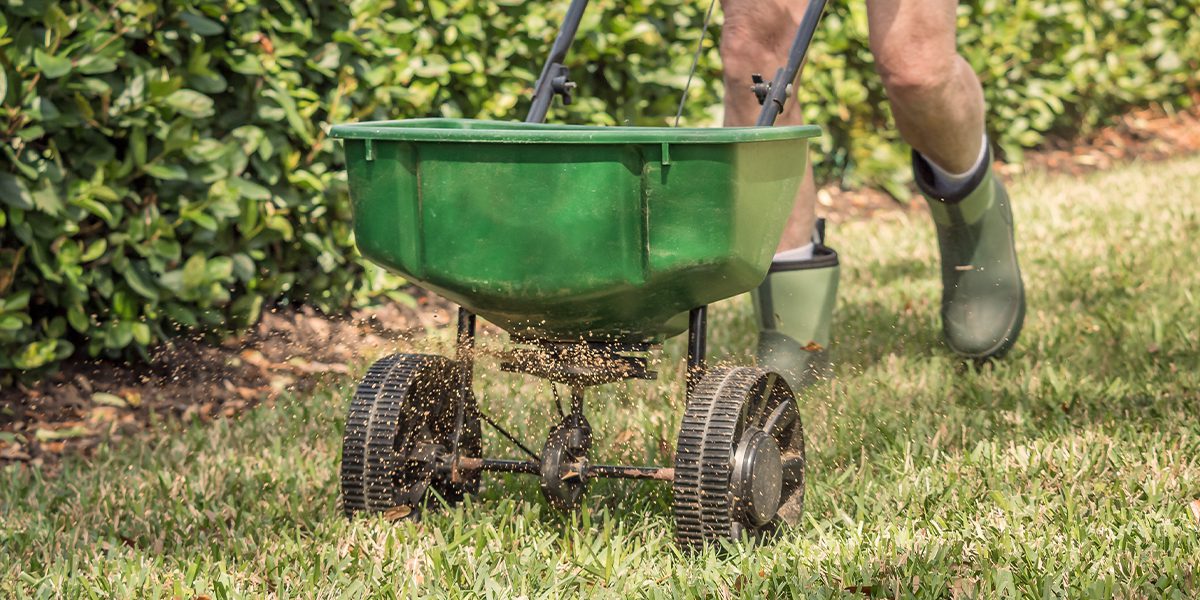Are you wondering what kind of fertilizer to use in your yard and garden? You’re not alone! With so many choices out there, it’s hard to know what’s best for your specific plants. But with a little knowledge, you can make well-informed decisions about how and what to use. This guide gives you an overview of the different types of fertilizers best suited for your vegetables, trees, shrubs, roses, and container plants!
Understanding Fertilizer
Fertilizer is often called “food” for plants, but it doesn’t work quite like that. In reality, plants make their own food by creating sugars through the photosynthesis of sunlight. Instead, think of fertilizer as a protein shake for your yard; it simply supplements the nutrients and minerals in your soil, which plants need for photosynthesis and other processes.
A Guide to Different Fertilizer Types
Before you start using fertilizers, it’s helpful to gain a deeper understanding of the different kinds available to you and how they work:
Synthetic Fertilizer
Synthetic fertilizers contain the essential elements that plants need for growth: Nitrogen (N), Phosphorus (P), and Potassium (K). Each element is responsible for a different type of growth. In general:
- Nitrogen boosts foliage and stem growth.
- Phosphorus promotes blossom, root, and fruit growth.
- Potassium supports water and nutrient intake and disease resistance.
While the ratios of these elements will vary depending on the product you choose, they are always clearly indicated on the fertilizer package in this order: N-P-K. For example, a fertilizer of 10-5-5 has twice as much nitrogen as phosphorus and potassium.
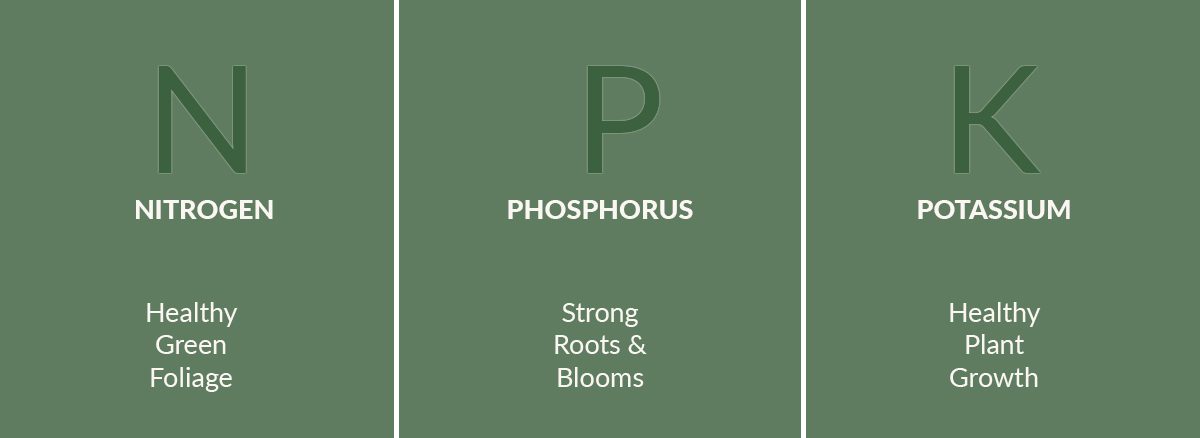
Selecting a fertilizer with the right ratio is vital for encouraging the kind of growth you want. For example, if you want to encourage fruit on your tomato, you’ll want to use a fertilizer that favors fruit development. If you instead want to thicken up the lawn in your backyard, you’ll want to use a grass-specific fertilizer. If you’re ever in doubt, most fertilizers list their intended uses directly on their packaging, making it easy to select the best one for your specific needs.
Compost and Aged Manure
Compost and manure are traditional fertilizers that have been used to grow crops for thousands of years. A compost pile mimics the natural processes of a forest floor, where microorganisms break down dead plant matter, turning it back into compounds that living plants can absorb and reuse. Likewise, manure takes advantage of a symbiotic relationship between animals and plants; animal waste is nutrient-rich, meaning it naturally enriches the soil and boosts plant growth as it’s returned to the earth.
Both compost and aged manure contain the nitrogen, phosphorus, and potassium your plants need to thrive. However, these nutrients are locked together with other materials, which means they slowly release them into the soil as they break down. Compost and aged manure also contain other trace minerals that enhance plant health, along with valuable microbes that boost your soil’s ecosystem.
Bone Meal and Blood Meal
These fertilizers are made from animal waste by-products. Bone meal is high in calcium and phosphorus, whereas blood meal is high in nitrogen.
Compost Tea
Compost tea is a liquid fertilizer you can make at home by soaking decaying plant matter in water. When sprayed on your garden, compost tea increases the microbial activity in the soil, creating a richer ecosystem and allowing more nutrients to become available for your plants.
A Guide for Fertilizing Your Chicago Yard
Whether you’re looking to use organic or synthetic fertilizers, here are a few guidelines and best practices for a few common plants you might have growing in your yard:
Fertilizing Roses
Roses benefit from organic fertilizers like compost, aged manure, bone meal, and blood meal. Roses require a large volume of phosphorus to thrive, so specialty rose fertilizers often include a high phosphorus ratio. Look for a fertilizer with a ratio of around 18-24-16 for the best results.
Fertilizing Vegetables
Compost or aged manure works best for vegetable gardens and can be worked into the soil at the beginning or end of the season. Through the spring and summer, you can top-dress your veggies with 1-2 inches of compost to promote growth and spray them with compost tea once per month. When using synthetic fertilizers, choose the following ratios:
- Leafy Vegetables: 2-1-1 or 3-1-1.
- Rooting Vegetables: 1-2-1.
- Fruiting Vegetables: 1-1-2 or 1-2-2.
- All-Purpose: 1-1-1.
Fertilizing Tomatoes
Tomatoes are heavy feeders that benefit from rich organic compost or aged manure worked into the soil before planting and top-dressed again during the growing season. You can also sprinkle bone meal at the beginning of the season to promote good fruit development. You can find many specialty synthetic fertilizers specifically designed for tomatoes with extra calcium and a nutrient ratio proven to encourage fruit development.
Fertilizing Flowering Plants
Perennials don’t need to be fertilized as much as some of the other plants in your yard, but they still benefit from a dressing of compost once per year. Annuals, on the other hand, benefit more from specialized synthetic fertilizers. Use a ratio of 1-2-1 or 1-5-1 to promote the growth and blooms of your annual flowers, and follow the instructions on the label to create a proper fertilizing schedule for your flowering plants.
Which Fertilizer Should I Use in My Yard?
The best fertilizers to use in yards are those with a higher nitrogen concentration and lower amounts of phosphorus and potassium, as the extra nitrogen encourages lush, green growth. As an organic alternative, you can also spread a thin layer of compost or aged manure throughout your yard. As it slowly washes through your yard’s top layer of thatch, it naturally replenishes your soil’s nutrient levels, boosting your grass’ growth. Regardless of the type of fertilizer you use, the best time to fertilize your yard is in the spring, as soon as you notice your grass beginning to grow again.
More Tips for Fertilizing Your Chicago Yard
- Adding compost or organic matter to the soil benefits all kinds of plants, from shrubs to vegetables and perennials.
- Specific synthetic fertilizers are often designed for certain types of plants, like tomatoes or annual flowers.
- Follow the instructions on your fertilizer’s label to guide your use and ensure you’re not overfertilizing the plants in your yard, as this can weaken their health and cause more harm than good.
Maintaining and regenerating soil health over time is essential to the long-term health of your garden and yard. If you need more guidance on fertilizing your yard, the expert growers at our garden centers in Bloomingdale and Carpentersville are more than happy to help you!
Platt Hill Nursery is Chicago’s premier garden center and nursery.
ADDITIONAL INFORMATION:
Sustainable Garden Ideas for a More Eco-Friendly Space
Our Guide to Composting
Heat Wave Gardening

